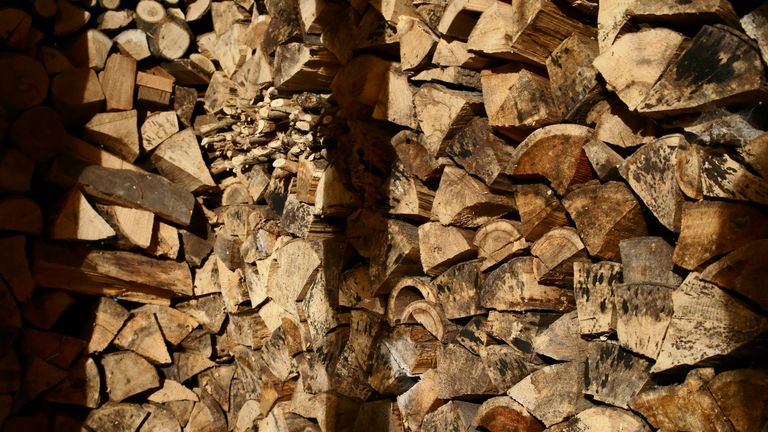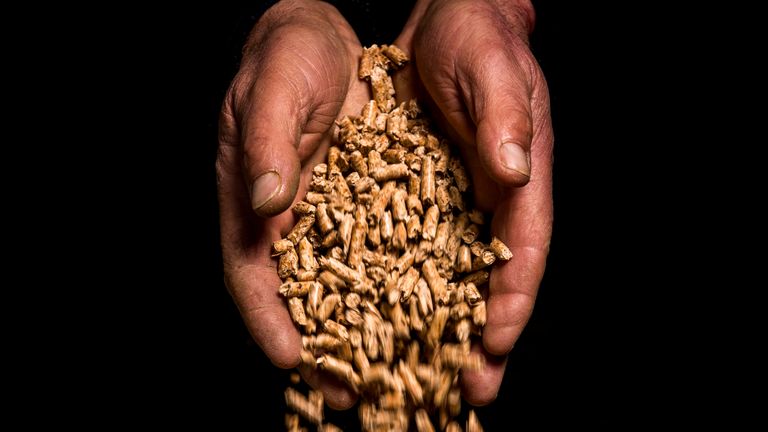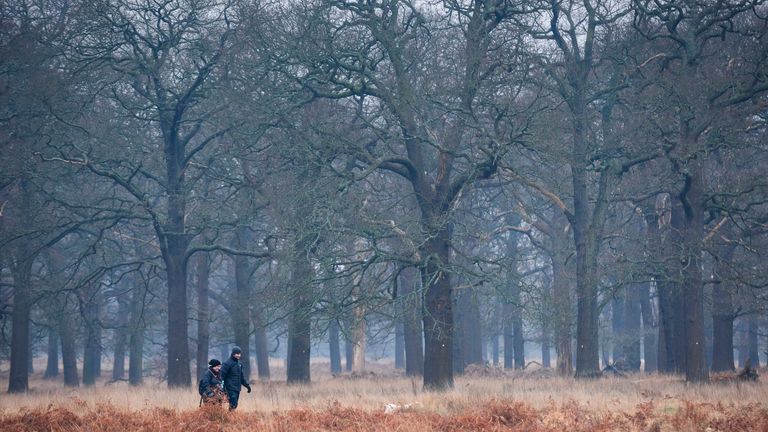Climate change: Former UN vice chair calls on UK to review policies on burning wood for energy
Saturday 13 March 2021 09:33, UK
A former vice chairman of the United Nations' climate advisory body has called on the British government to review its policies surrounding the burning of wood for energy.
Jean Pascal van Ypersele, Professor of Environmental Sciences at Université Catholique de Louvain in Belgium, has told Sky News he believes subsidies given to the industry by the UK government are "contradictory" to the goals of the Paris Climate Agreement - signed by countries in 2015 to try to limit global warming.
The Department of Business, Energy and Industrial strategy says subsidies are only given to biomass which complies with strict sustainability criteria and biomass is a "valuable" part of the National Grid.
Trees are a natural way to tackle climate change and soak up carbon.
But Mr van Ypersele, who was vice chairman of the IPCC - the body which assesses science on climate change - says burning wood pellets creates a 'carbon debt' and accounting rules don't properly take into consideration the time it takes for replacement trees to grow back.
He said: "We release the CO2 now hoping that future woods will absorb the CO2 in the future. But that's a very strong assumption. Burning wood doesn't make much sense if you want to reduce CO2 emissions."
The UK is the world's biggest importer of wood pellets. In the move away from coal over recent years there has been a switch towards burning biomass to generate power.
Last year in the UK, biomass powered 6.5% of the National Grid. Biomass can be scaled up when needed to support the increasing use of wind and solar.
It is classed as renewable energy - and subsidies have been committed to the industry by the government until 2027.
Data shared with Sky News from the think tank Ember showed that two UK power stations got more than a £1bn in subsidies and were excused from paying carbon taxes totalling more than £300m.
Mr van Ypersele said: "To subsidise an activity that has negative consequences for the climate and the environment is totally contradictory with the goals of the Paris Agreement and the goals of the conference (COP26) due to take place in Glasgow at the end of the year."
Drax power station in north Yorkshire survived by switching from coal to biomass and sees itself as part of the climate solution.
Drax stopped commercial coal generation this month. It is the UK's largest single-site renewable power generator, providing 11% of the UK's renewable power.
Its ambition is to be carbon negative by 2030 and Drax says it is confident the forests it sources from are growing at a greater rate than they are harvested. Nearly two-thirds of the wood pellets used by Drax come from forests in the southern United States.
Rebecca Heaton is Head of Sustainability at Drax Group and has responsibility for the sustainability of the global forest supply chains used to deliver biomass to its power station.
She said: "Whenever you remove wood from a forest you have to account for the CO2 you've removed. And that's the system we work under and adhere to. So I'm aware there are calls for these systems to be looked at. But I would say there is good biomass and bad biomass and you have to be really clear where your biomass has come from and be able to audit every part of the supply chain."
Five hundred leading scientists - including Mr van Ypersele - recently wrote to world leaders - including the US president - calling for biomass not to be classed as carbon neutral.
In the letter, they wrote: "We urge you not to undermine both climate goals and the world's biodiversity by shifting from burning fossil fuels to burning trees to generate energy… To meet future net zero-emission goals your government should work to preserve and restore forests and not to burn them."
The status of biomass as a green energy source means its emissions when burnt at the smoke stack - which are actually greater than coal - are not counted in government statistics.
Duncan Brack was special adviser at the Department of Energy and Climate Change between 2010 and 2012 and has spent years researching biomass.
He said: "If you did include emissions from burning biomass we'd be making much slower progress towards net zero than some people tend to think. And that's because we're importing biomass from overseas and kind of the problem is sort of shunted off to other countries. And I think that's not right. I think countries have to take responsibility for the emissions. So that means having another look at biomass and the policy framework that surrounds the biomass industry."
The government says a 'diverse' mix of low carbon generation technologies have a role to play in decarbonising the power sector and that the Committee on Climate change - which advises the government on how to get to net-zero - see an important role for biomass.





